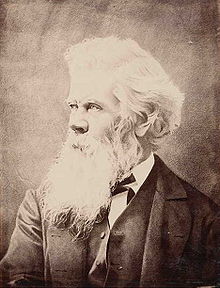Henry Parkes
|
The Honourable Sir Henry Parkes GCMG |
|
|---|---|
 |
|
| 7th. Premier of New South Wales Elections: 1872, 1874-75, 1877, 1880, 1882, 1887, 1889, 1891 |
|
|
In office 14 May 1872 – 8 February 1875 |
|
| Monarch | Victoria |
| Governor | Sir Hercules Robinson |
| Preceded by | Sir James Martin |
| Succeeded by | Sir John Robertson |
| Constituency |
Mudgee East Sydney |
|
In office 22 March 1877 – 16 August 1877 |
|
| Monarch | Victoria |
| Governor | Sir Hercules Robinson |
| Preceded by | Sir John Robertson |
| Succeeded by | Sir John Robertson |
| Constituency | East Sydney |
|
In office 21 December 1878 – 4 January 1883 |
|
| Monarch | Victoria |
| Governor |
Sir Hercules Robinson Augustus Loftus |
| Preceded by | James Farnell |
| Succeeded by | Sir Alexander Stuart |
| Constituency |
Canterbury East Sydney Tenterfield |
|
In office 25 January 1887 – 16 January 1889 |
|
| Monarch | Victoria |
| Governor | The Lord Carrington |
| Preceded by | Sir Patrick Jennings |
| Succeeded by | Sir George Dibbs |
| Constituency | St Leonards |
|
In office 8 March 1889 – 23 October 1891 |
|
| Monarch | Victoria |
| Governor |
The Lord Carrington The Earl of Jersey |
| Preceded by | Sir George Dibbs |
| Succeeded by | Sir George Dibbs |
| Constituency | St Leonards |
| Personal details | |
| Born | 27 May 1815 Canley, Coventry, England |
| Died | 27 April 1896 (aged 80) Sydney, Colony of New South Wales |
| Resting place | Faulconbridge, New South Wales |
| Nationality | British subject |
| Political party | Free Trade Party |
| Spouse(s) | Clarinda Varney (m.1836-d.1888) Eleanor Dixon (m.1889-d.1895) Julia Lynch (m.1895-96) |
| Children | Thomas Clarinda Martha Clarinda Sarah Robert Mary Mary Edith Milton Lily Maria Annie Gertrude Varney Lily Faulconbridge Sydney Kenilworth Aurora Henry Cobden Charles Jessel |
| Profession | Statesman |
| Religion | Anglican |
Sir Henry Parkes, GCMG (27 May 1815 – 27 April 1896) was a colonial Australian politician and longest non-consecutive Premier of the Colony of New South Wales, the present-day state of New South Wales in the Commonwealth of Australia. He has been referred to as the "Father of Federation" due to his early promotion for the federation of the six colonies of Australia, as an early critic of British convict transportation and as a proponent for the expansion of the Australian continental rail network
Parkes delivered his famous Tenterfield Oration in 1889 which led to his instigation of a conference in 1890 and a Constitutional Convention in 1891, the first of a series of meetings that led to the federation of Australia. He died in 1896, five years before this process was completed. He was described during his lifetime by The Times as "the most commanding figure in Australian politics". Alfred Deakin described Parkes as having flaws but nonetheless being "a large-brained self-educated Titan whose natural field was found in Parliament".
Parkes was born in Canley (now a suburb of Coventry) in Warwickshire, England, and christened in the nearby village of Stoneleigh. His father, Thomas Parkes, was a small-scale tenant farmer. Little is known about his mother, who died in 1842. He received little schooling, and at an early age was working on a ropewalk for 4 pence a day. His next work was in a brickyard, describing it as "breaking stones on the Queen's highway with hardly enough clothing to protect him from the cold". He was then apprenticed to John Holding, a bone and ivory turner at Birmingham, and around 1832 joined the Birmingham political union. Between then and 1838 he was associated with the political movements that were then endeavouring to better the conditions endured by the working classes.
...
Wikipedia
